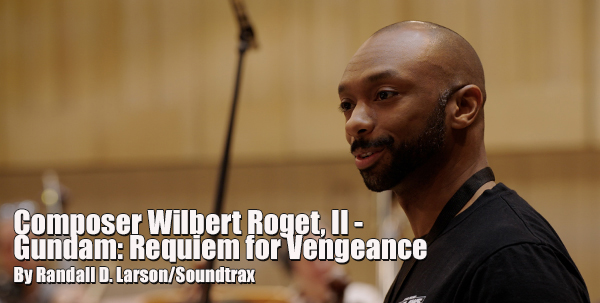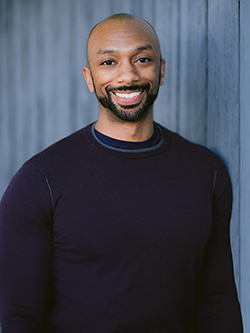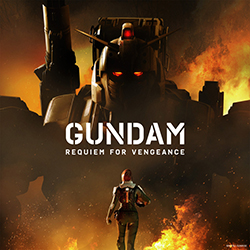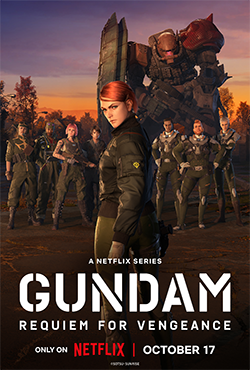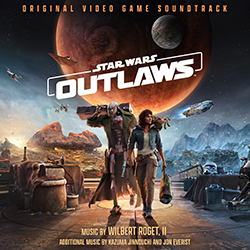
 |
||
|
Soundtrax 2024-11A: Special Edition
November 2024 –Interview SpecialComposer Wilbert Roget, II - Gundam: Requiem for Vengeance
Wilbert Roget, II, is a veteran composer in the video game industry. He joined LucasArts as a staff composer in 2008, where he scored several games in the Star Wars universe, including Star Wars: The Old Republic and Star Wars: First Assault. He later became a freelance writer, scoring Helldivers 2, Star Wars: Outlaws, Mortal Kombat 1 and 11, Call of Duty: WWII, Pacific Drive, Lara Croft and the Temple of Osiris, and several other indie and AAA titles. He also composed the score to the new anime miniseries, Gundam: Requiem for Vengeance (Netflix). His scores have earned him several awards and nominations from the Game Audio Network Guild, the Academy of Interactive Arts and Sciences (D.I.C.E. Awards), and others.
Roget also co-founded Impact Soundworks, a successful music software company, and is an accomplished lecturer on game music, giving talks at the Game Developers Conference, San Francisco Conservatory of Music, Yale University and other institutions. He frequently gives online masterclasses and tutorials on music composition and production and has a passion for teaching the craft.
Inspired at an early age by classic Japanese game soundtracks, Roget specializes in writing music that employs memorable themes, developed throughout the score in a traditional fashion. He balances modern production with classic construction, creating fresh and contemporary soundscapes as well as nuanced orchestrations. Wilbert studied music at Yale University, is originally from Philadelphia, PA and currently resides in Seattle, WA. He is an avid multi-instrumentalist, performing solo flute, keyboards, accordion and guitar on many of his scores.
I spoke to Wilbert on his latest release, the original soundtrack to the Netflix series Gundam: Requiem for Vengeance co-produced by the Japanese animation studio SAFEHOUSE Inc, under SUNRISE (production studio of Gundam) and Bandai Namco Filmworks (owner of SUNRISE). The score was recorded by the Eminence Symphony Orchestra and TaikOz (taiko ensemble) at Trackdown Studios in Australia. Engineered and mixed by John Kurlander (Lord of the Rings) and conducted by Phillip Chu (Hong Kong Philharmonic).
Q: You're known as a veteran composer for video games. How did you get started on that?
Wilbert Roget: I have wanted to write video games since high school. I played Final Fantasy 7 in my first year of high school, and even though I'd already been a classical pianist for as long as I can remember, this was the first time I knew what I wanted to do with music in my life. Throughout high school, I'd done a lot of music transcriptions for video game music; in fact, back then, this was so long ago that it predated MP3s! If you wanted to hear the music from your favorite videogame, you only had two choices – either you'd buy the CD for an astronomical amount of money, or you'd find the MIDI file that some big basement-dwelling nerd painstakingly transcribed – and I was one of the basement-dwelling nerds! But that's taught me everything I know about composition, really, was those transcriptions. Eventually, I started writing music for very small indie titles, most of which never even saw the light of day. After that, I went to college, majored in music, and started attending the game developers conference. I joined the Game Audio Network Guild, and eventually, the connections came together, and I got hired at LucasArts. That's really where I started my game career.
Q: What does it take to create the music for a lengthy video game and keep pace with the gamers' activities throughout the game?
Wilbert Roget: The important thing is to make sure that you understand the gameplay and the story itself so you can organize the soundtrack so that the music responds to the gameplay and where the player is in the story. Say, for instance, maybe the music would have a different contour at the beginning of the game, where maybe their hopes are up, or the stakes aren't as high, but by the end of the game, the stakes are very high, and the music has a different vibe to it. But moment to moment, it's always great to have music systems, like what we have on Star Wars: Outlaws, where it's responding to, maybe right now, you're in combat mode. Still, then you might start to hide, and so the music can adjust, or perhaps you were fighting little cannon fodder like a couple of storm-troopers, then a death trooper shows up, and how does the music respond to that? You're always trying to find ways for the music to be as interactive as needed for the moment-to-moment gameplay.
Q: Video game music, of course, takes on a much different structure than a movie score since the music needs to operate across longer arcs and interface with the players' movements. How have you maneuvered through this environment when scoring video games?
Wilbert Roget: A lot of it is based on systems. As a composer, I have no idea how long the player will spend in this area. Maybe they'll hang around and admire the scenery, perhaps they'll get into a fight immediately, I don't know – and so we set up these systems so that music can loop in a particular area based on however many parameters we've set up – for example, maybe in this area, there's no combat but because you've been here a while, then it's going to go into a more subtle arrangement of the music rather than playing the full arrangement every single time. But then, you might get into a combat or a stealth situation. Then, it will change to a system that looks at the player's situation and tries to underscore that with however many stems or how we've set up the interactivity.
Q: What brought you into scoring new Gundam Anime series?
Wilbert Roget: I have a friend, Hiroaki Yura, who I've worked with previously on the SOULCALIBUR V. I was an assistant orchestrator on that project, and that's how we got to know each other. I'd never worked on any major Japanese video games, but Gundam: Requiem for Vengeance is an anime project Bandai Namco Filmworks, and also he’d had in mind for quite some time. I worked with Hiro on and off on smaller projects, advertisements, demos, and even the WARHAMMER Vignette a few weeks ago. We actually scored that several years ago – but by this time, we'd known each other, and he knew my musical style. When the opportunity came up to a Gundam series that focused on the gritty realism of war, it used the Unreal 5 Engine, and they had a new director out of Germany who wanted to do the project. I told Hiro: "Maybe we can have a Western composer as well, in addition to this Western director, and get a fresh, new take on Gundam that would appeal to Japanese and Western sensibilities.
At that point, I had already written the score to CALL OF DUTY: WWII, which was also a very military shooter, but it was trying to get into the vulnerability of each soldier; it wasn't like a Super Soldier We're So Awesome, We're So Great kind of thing, it was examining the psychology of what it is like to be just one lone soldier. Maybe you have your Platoon with you or some weaponry, but you're outnumbered, outclassed; what does that feel like? And that's exactly the vibe we needed for this Gundam piece, too. So, he hired me for that; I started getting scripts and even some concept art, maybe three-and-a-half years ago, perhaps even longer than that. The script went through many iterations, but every single time I would get the new scripts, take my notes, and finally, I think at the beginning of 2023, we started to get some final footage and I could do a proper scoring of the series.Q: You recently scored STAR WARS: OUTLAWS, the first-ever open-world STAR WARS game, set between the events of STAR WARS: THE EMPIRE STRIKES BACK and STAR WARS: RETURN OF THE JEDI. What can you tell me about scoring this immersive, single-player game?
Wilbert Roget: It has been an incredible privilege to contribute to the STAR WARS franchise through the years, and I'm honored to present the score to STAR WARS OUTLAWS! It's been a dream-come-true collaboration with co-composers Jon Everist and Kazuma Jinnouchi, the Royal Scottish National Orchestra, and Nashville Scoring Orchestra, brilliant soloist musicians from around the world, and our world-class recording, production, and orchestration teams. To score this galaxy-spanning adventure, we blended the classic orchestral sound of John Williams' original STAR WARS trilogy with world instruments, designed sounds, and modern production. To support the open-world game design, we also developed a fully interactive music system, dynamically rearranging the score in real-time based on gameplay. My sincerest thanks to the teams at Massive, Ubisoft, Disney, and Lucasfilm Games for bringing me on this journey – and I hope the players enjoy this new adventure!
Watch the STAR WARS: OUTLAWS Official Trailer:
Q: Your latest major project was scoring Gundam: Requiem for Vengeance. How would you describe your thematic structure for the music in this project?
Wilbert Roget: The exciting thing about that is how Japanese animated projects usually work. What surprised me was that they wanted to hear the melodic themes first, even before I had final footage or anything like that. I think perhaps months before I had any final footage to score to, they were asking, "We need to hear the Principality of Zeon theme, and we need to hear the Earth Federation Forces (E.F.F.) theme, and we need the theme for this character and that character, and then the Gundam itself and all that," which surprised me, because I was thinking, "well, what am I scoring too?!" In my Western brain, I'm thinking, "That's just the melody, and then I can paint it in various ways with the orchestration and the arrangement. But they really just wanted to have something, so they were OK with just sending piano sketches – in fact, they preferred that rather than anything orchestrated so they could wrap their minds around my melodic plan for the score. As a result, there are many melodies throughout the soundtrack – sometimes, they'll only get played once through the entire miniseries. However, it was still crucial to the SUNRISE and the Bandai Namco teams to hear exactly what that melody would be before I committed to any kind of arrangement or orchestration. So that's why the melodies are so plentiful, and I attempted to make them quite prominent.
"Gundam: Requiem for Vengeance" Trailer 2
Q: When you began scoring the series, how did you start that aspect of the production and the characterization you needed to do as you got into the series properly?
Wilbert Roget: It all began, again, with analyzing the script. I printed out the script, and I would be going here at home, or I'd just get a coffee somewhere; I would write whatever I heard in my head in the margins if an idea popped in. Maybe this could be what the GUNDAM theme is, or maybe there's a battle scene, and I thought, oh, perhaps this melody would work well; let's try that. So, I would write my little musical sketches in abbreviated notations in the margins, which would carry on for years. I would keep sketches all around my apartment and studio, and I'll just jot down if I have some random idea for a piece that might work for Gundam or any other project. By the end, we quickly have two albums worth of sketches and music, one of which I might do as a separate entity for fun. I wrote so much music just to get into the mindset of what we wanted to do with the show.
What's interesting to me is that this, boldly, is a different direction from previous recent Gundam scores. Initially, I thought they would want to do something closer to a show like MOBILE SUIT GUNDAM UC(UNICORN), written by a brilliant composer, Hiroyuki Sawano. His score did incorporate a lot more, like heavy metal influences. There were vocal tracks and some very extroverted guitars, and there were a lot of melodies just right in front, but what the Bandai Namco team and the Safehouse team wanted for REQUIEM FOR VENGEANCE was that it was still melodic. Still, it had more of a gravity to it. It had gravitas. It wanted to show the dirty side of war rather than the heroic, more extroverted side. I think REQUIEM FOR VENGEANCE is unique as well because the main character, usually in Gundam shows, not always but usually is a much younger participant who's piloting the Gundam – well, in this case, you're following the enemies of the Gundam side. The Earth, which the E.F.F. owns, always piloted the GUNDAM. In contrast, the enemy of the Earth Federation Forces, the Principality of Zeon, is now taking their side, showing it from their perspective with a much older and more mature protagonist. So, it required a different musical approach to the previous iterations of the show, but I still wanted to make sure that it connected. I watched a lot of the Gundam series, especially the initial 1979, the very first ones – and then some other Gundam series that were by composers that I admired greatly, like Yoko Kanno and Kenji Kawai, just to refresh my memories of this is why I got into music in the first place! So, I took all of that on board, but then made sure that I was doing what the show needed rather than my stereotypes of what Gundam sounded like.
Q: How would you describe your instrumentation for the Gundam series?
Wilbert Roget: The orchestra is the primary sound. We also recorded Taiko drums from a group in Sydney, Australia, called TaikOz, who are brilliant players. In addition, there are many different solo musicians playing typical instruments like violin and cello, but also world instruments and especially world vocals. I sourced all of these players from Europe because there's something about the GUNDUM – and this particular part of GUNDUM history – where it's a very European conflict. The show takes place entirely in Eastern Europe, which is why I hired a Ukrainian vocalist. She sings with this very Slavic style, which significantly influences me. I love that East European style of harmony and rhythm, which is prominent on uneven meters, and the harmonies that embrace these very close, clustery consonances and dissonances. I wrote for her in that style, so it has – or I attempted to have – an East European folk sound permeating even through the orchestral music, but also some Western European influences, especially in the orchestra. It sounds classical, in a way. There's something about the GUNDAM franchise that leads all of its composers to have this more classical/Western European sound, more than we do in all of our other scores!
Q: I wanted to ask about four of the cues you've composed for the GUNDAM series, which quite interested me. The first track was "The One Year War," a very poignant cue that opens the score; "Ambushed," on track 4, a highly fierce and active cue; Track 15's "Gearheads," a reasonably rollicking cue, and then Track 18's "Friendly Fire."
Wilbert Roget: The first track, "The One Year War," is what we called a statement theme, where it wasn't synchronized to visuals at all. They just asked me to write a track that encompasses this show and the subject matter. They suggested that I base it on the One Year War, which is the specific conflict that this particular show revolved around. I wanted it to have a sound that started off almost folksy, hence starting off with the acoustic guitar but then grows into this big, epic conflict that has a sort of bravado to it because I wanted it to sound like something that encompasses quite literally, the entire world and everyone who's a part of this. Everyone feels the effects of war. "Ambush" is the first piece of combat music in the show, and I wanted that to sound very desperate, but then it starts to establish a dichotomy between ground fighting, which is soldiers on the ground, and then the Mobile Suits, which are these giant, epic, unbelievably powerful machines that are piloted usually by one pilot. You'll hear something like string ostinatos and such, but when the Mobile Suits come into play, you get the big, brassy melodies and huge, epic sounds.
Similarly, with "Friendly Fire," that's all-ground combat, so it's all about those solo cello riffs. Lukas Staseviskij is a solo player. He's also Ukrainian and Finnish, so he recorded it there. He is a brilliant player and has a very aggressive style of cello playing, which worked well. And, finally, "Gearheads," it was fun to write that. It's played during a montage when the heroes have found themselves in a recycling facility. The Principality of Zeon have just been annihilated; this is the closest they can find for any base. They're taking refuge there, and they realize that they have enough spare parts to build a Mobile Suit from scratch – kind of – it's not incredibly well built, but it's as good as they can do. This is during the montage when they're putting these pieces together. So, I just wanted to write something fun. This is anime, and there was more freedom, stylistically and in terms of music genre, that I usually get with Western videogames, so I wanted to exercise that and have a nice baseline going and an excellent drum beat by Anup Sastry, who is a brilliant drummer. He usually plays metal, as you can get from his playing style. And then, of course, the trumpet melodies were Sam Dechenne and Michael Pflug, and that's hearkening back to the melody introduced in the One Year War, again just showing the context of all of these scenes coming together and supporting the One Year War.
Q: Any final comments about working on GUNDAM that we haven't discussed yet?
Wilbert Roget: First off, I just want to say that I'm unbelievably grateful. I could easily be wrong, but I'm pretty sure that I might be the first Western composer ever to touch this franchise as a composer. It's a significant franchise in Japan, dating back 45 years. It's important not only as a show but also as a toy manufacturer. The Gundam toys, or Gunpla as they call them, are extremely important and extremely widespread. To become a part of this franchise is an unbelievable honor. And again, I would almost say that more than any other franchise I've walked into, this was the most intimidating, not just because the franchise is massive. Still, also because so many of my favorite composers are Gundam composers as well, like Kow Otani, Yoko Kanno, who I mentioned earlier, Kenji Kawai as well, so many brilliant composers have written for this franchise, and so alright, now it's your turn, Will! Good luck! You can't imagine how terrifying that was at first! I'm incredibly grateful to the team over at SAFEHOUSE and to Hiroaki Yura, he's the one who hired me; he's our sound director, just for supporting me throughout this entire series, and being very open to lots of different musical influences and my creative vision for how could make this into the best show that we possibly could.
Netflix series GUNDAM: REQUIEM FOR VENGEANCE original soundtrack is out now.Special thanks to Greg O’Connor-Read of Top Dollar PR for facilitating this interview.
